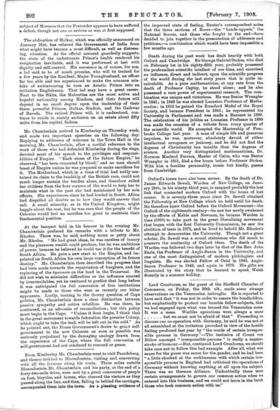Death during the past week has dealt heavily with both
Oxford and Cambridge. Sir George Gabriel Stokes, who died on February 1st in his eighty-fifth year, probably possessed the profoundest scientific intellect of our time, and exercised an influence, direct and indirect, upon the scientific progress of the world during the last sixty years that is quite in- calculable. As a pure mathematician, at any rate from the death of Professor Cayley, he stood alone ; and he also possessed a rare power of experimental research. The com- bination was unique and victorious. He was Senior Wrangler in 1841; in 1849 he was elected Lucasian Professor of Mathe- matics; in 18.52 he gained the Rumford Medal of the Royal Society, and became President in 1885; he represented his University in Parliament and was made a Baronet in 1889. The celebration of his jubilee as Lucasian Professor in 1899 was made the occasion of a tribute from every quarter of the scientific world. He accepted the Mastership of Pem- broke College last year. A man of simple life and generous impulses, he was, moreover, absolutely devoid of either intellectual arrogance or jealousy, and he did not find the dogmas of Christianity less tenable than the dogmas of science. Another very distinguished mathematician, Dr. Norman Macleod Ferrero, Master of Caine, who was Senior Wrangler in 1851, died a few hours before Professor Stokes. With him a familiar personality, ironic but kindly, passes from Cambridge.










































 Previous page
Previous page